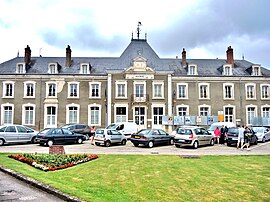Saint-Fargeau
Saint-Fargeau | |
|---|---|
 The town hall in Saint-Fargeau | |
 Coat of arms | |
show Location of Saint-Fargeau | |
 Saint-Fargeau | |
| Coordinates: 47°38′30″N 3°04′19″E / 47.6417°N 3.0719°ECoordinates: 47°38′30″N 3°04′19″E / 47.6417°N 3.0719°E | |
| Country | France |
| Region | Bourgogne-Franche-Comté |
| Department | Yonne |
| Arrondissement | Auxerre |
| Canton | Cœur de Puisaye |
| Intercommunality | Puisaye-Forterre |
| Government | |
| • Mayor (2020–2026) | Dominique Charpentier |
| Area 1 | 67.20 km2 (25.95 sq mi) |
| Population (Jan. 2018)[1] | 1,542 |
| • Density | 23/km2 (59/sq mi) |
| Time zone | UTC+01:00 (CET) |
| • Summer (DST) | UTC+02:00 (CEST) |
| INSEE/Postal code | 89170 /89344 |
| Elevation | 182–280 m (597–919 ft) (avg. 215 m or 705 ft) |
| 1 French Land Register data, which excludes lakes, ponds, glaciers > 1 km2 (0.386 sq mi or 247 acres) and river estuaries. | |
Saint-Fargeau is a commune in the Yonne department in Bourgogne-Franche-Comté in north-central France, in the historical region of Puisaye.
Main sights[]
- Saint-Ferréol church, built in Gothic style in the 14th and 15th centuries. Notable burials: heart of Antoine de Chabannes, whose body was laid to rest in Dammartin-en-Goële; burials of his wife Marguerite de Nanteuil (ca. 1422-1475), and of his son and successor Jean de Chabannes (1462-1503).
- Château de Saint-Fargeau (Saint-Fargeau Castle) mostly built in the 15th and 17th centuries.
- Musée de l'Aventure du Son (Museum of Sound Discovery) displaying more than 1000 gramophones, radios and mechanical musical instruments.
Personalities[]
- Saint Fargeau, or Ferreolus, (died c. 212), an early Christian martyr
- Antoine de Chabannes, a significant figure of France's 15th-century history, acquired Saint-Fargeau and other lands in Puisaye previously held by the disgraced Jacques Coeur. He reconstructed the castle in the late 1460s and made other investments in the town, including the foundation of a hospital.
- In the early years of the reign of Louis XIV, the château was the home to his exiled cousin, the wealthy Anne Marie Louise d'Orléans.[2] She lived in the château of the town, giving the building its present appearance. The building also has her monogram over its main entrance. She held the title of duchesse de Saint-Fargeau in her own right. A fire in 1752 and further damage in 1850 has largely destroyed the original building.
- Jean d'Ormesson - a French novelist, mostly writing partially or totally autobiographic novels. He was brought up at the château and was born in 1925.
- Robert Gall 1918 - 1990 - was a French lyricist.
See also[]
References[]
- ^ "Populations légales 2018". INSEE. 28 December 2020.
- ^ Wilson, Katharina M., "An Encyclopedia of Continental Women Writers", P863. Published 1991, Taylor & Francis. ISBN 0-8240-8547-7
| Wikimedia Commons has media related to Saint-Fargeau (Yonne). |
External links[]
Categories:
- Communes of Yonne
- Yonne geography stubs


